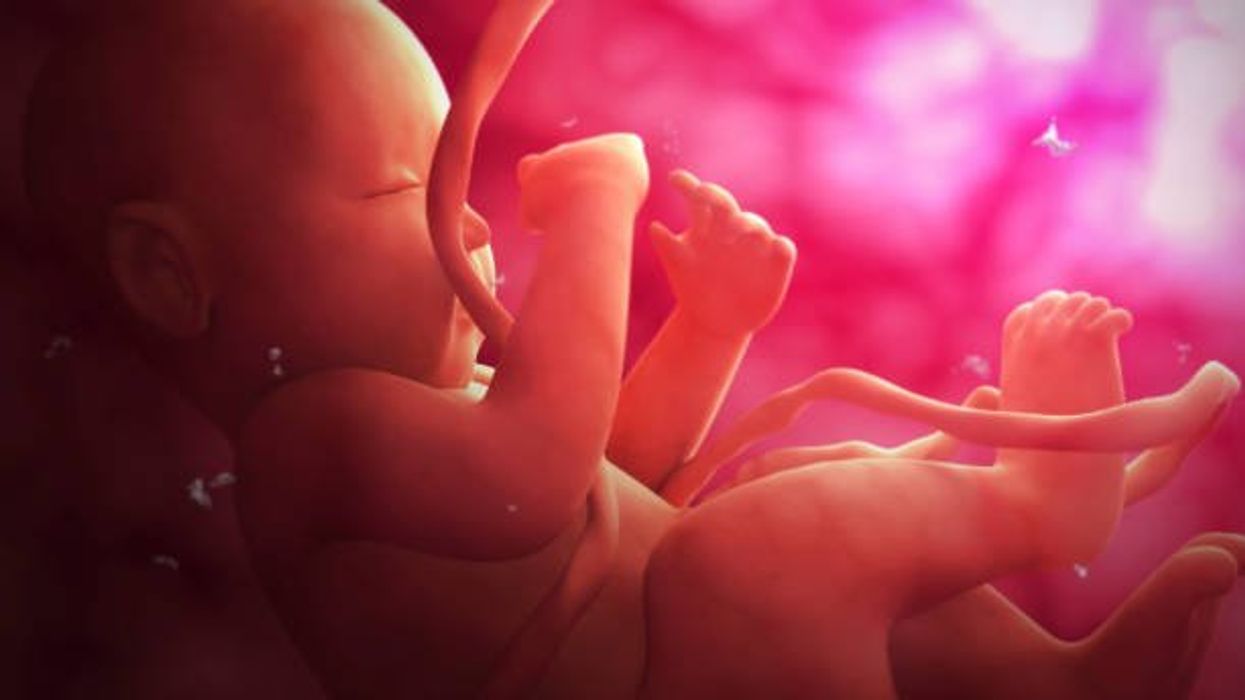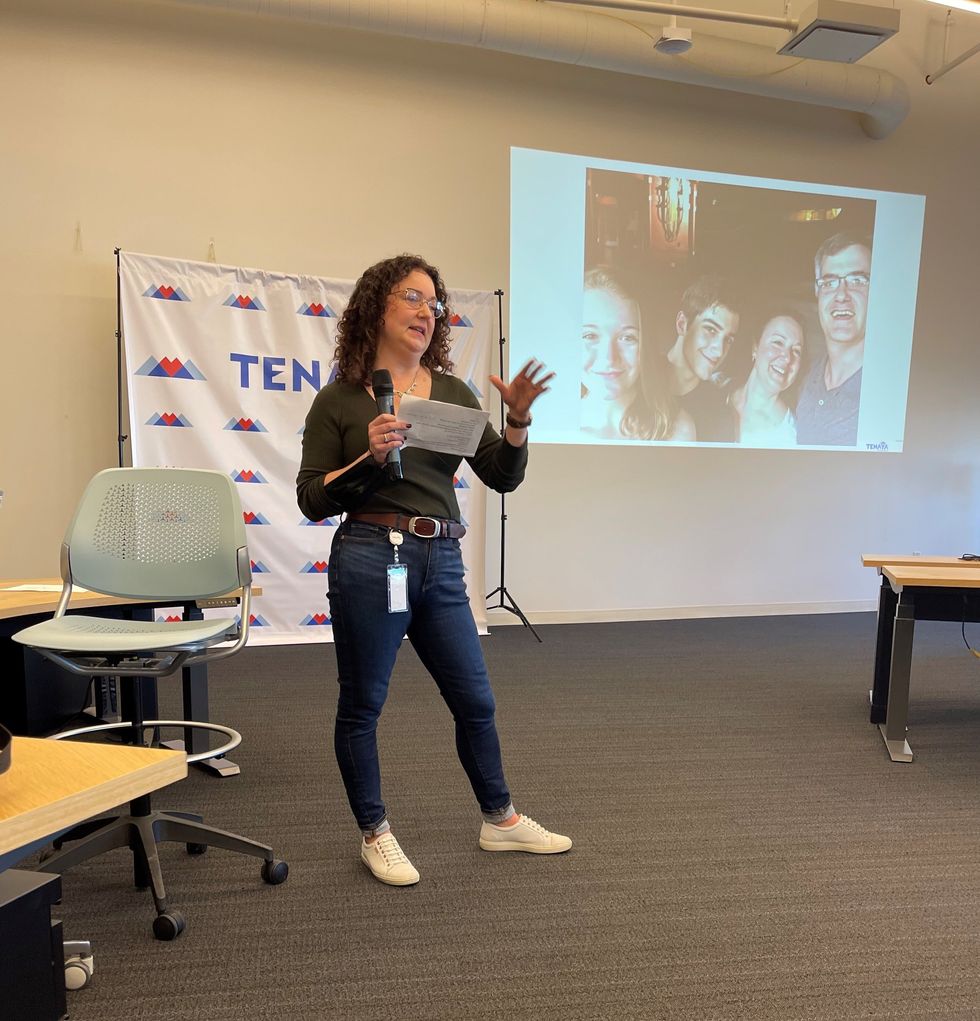Fetuses can save their mothers' lives

Stem cells from a fetus can travel to the heart and regenerate the muscle, essentially saving a mother’s life.
Story by Big Think
In rare cases, a woman’s heart can start to fail in the months before or after giving birth. The all-important muscle weakens as its chambers enlarge, reducing the amount of blood pumped with each beat. Peripartum cardiomyopathy can threaten the lives of both mother and child. Viral illness, nutritional deficiency, the bodily stress of pregnancy, or an abnormal immune response could all play a role, but the causes aren’t concretely known.
If there is a silver lining to peripartum cardiomyopathy, it’s that it is perhaps the most survivable form of heart failure. A remarkable 50% of women recover spontaneously. And there’s an even more remarkable explanation for that glowing statistic: The fetus‘ stem cells migrate to the heart and regenerate the beleaguered muscle. In essence, the developing or recently born child saves its mother’s life.
Saving mama
While this process has not been observed directly in humans, it has been witnessed in mice. In a 2015 study, researchers tracked stem cells from fetal mice as they traveled to mothers’ damaged cardiac cells and integrated themselves into hearts.
Evolutionarily, this function makes sense: It is in the fetus’ best interest that its mother remains healthy.
Scientists also have spotted cells from the fetus within the hearts of human mothers, as well as countless other places inside the body, including the skin, spleen, liver, brain, lung, kidney, thyroid, lymph nodes, salivary glands, gallbladder, and intestine. These cells essentially get everywhere. While most are eliminated by the immune system during pregnancy, some can persist for an incredibly long time — up to three decades after childbirth.
This integration of the fetus’ cells into the mother’s body has been given a name: fetal microchimerism. The process appears to start between the fourth and sixth week of gestation in humans. Scientists are actively trying to suss out its purpose. Fetal stem cells, which can differentiate into all sorts of specialized cells, appear to target areas of injury. So their role in healing seems apparent. Evolutionarily, this function makes sense: It is in the fetus’ best interest that its mother remains healthy.
Sending cells into the mother’s body may also prime her immune system to grow more tolerant of the developing fetus. Successful pregnancy requires that the immune system not see the fetus as an interloper and thus dispatch cells to attack it.
Fetal microchimerism
But fetal microchimerism might not be entirely beneficial. Greater concentrations of the cells have been associated with various autoimmune diseases such as lupus, Sjogren’s syndrome, and even multiple sclerosis. After all, they are foreign cells living in the mother’s body, so it’s possible that they might trigger subtle, yet constant inflammation. Fetal cells also have been linked to cancer, although it isn’t clear whether they abet or hinder the disease.
A team of Spanish scientists summarized the apparent give and take of fetal microchimerism in a 2022 review article. “On the one hand, fetal microchimerism could be a source of progenitor cells with a beneficial effect on the mother’s health by intervening in tissue repair, angiogenesis, or neurogenesis. On the other hand, fetal microchimerism might have a detrimental function by activating the immune response and contributing to autoimmune diseases,” they wrote.
Regardless of a fetus’ cells net effect, their existence alone is intriguing. In a paper published earlier this year, University of London biologist Francisco Úbeda and University of Western Ontario mathematical biologist Geoff Wild noted that these cells might very well persist within mothers for life.
“Therefore, throughout their reproductive lives, mothers accumulate fetal cells from each of their past pregnancies including those resulting in miscarriages. Furthermore, mothers inherit, from their own mothers, a pool of cells contributed by all fetuses carried by their mothers, often referred to as grandmaternal microchimerism.”
So every mother may carry within her literal pieces of her ancestors.
As gene therapies and small molecule drugs are being studied in clinical trials, companies increasingly see the value in hiring patients to help explain the potential benefits.
As a child, Wendy Borsari participated in a health study at Boston Children’s Hospital. She was involved because heart disease and sudden cardiac arrest ran in her family as far back as seven generations. When she was 18, however, the study’s doctors told her that she had a perfectly healthy heart and didn’t have to worry.
A couple of years after graduating from college, though, the Boston native began to experience episodes of near fainting. During any sort of strenuous exercise, my blood pressure would drop instead of increasing, she recalls.
She was diagnosed at 24 with hypertrophic cardiomyopathy. Although HCM is a commonly inherited heart disease, Borsari’s case resulted from a rare gene mutation, the MYH7 gene. Her mother had been diagnosed at 27, and Borsari had already lost her grandmother and two maternal uncles to the condition. After her own diagnosis, Borsari spent most of her free time researching the disease and “figuring out how to have this condition and still be the person I wanted to be,” she says.
Then, her son was found to have the genetic mutation at birth and diagnosed with HCM at 15. Her daughter, also diagnosed at birth, later suffered five cardiac arrests.
That changed Borsari’s perspective. She decided to become a patient advocate. “I didn’t want to just be a patient with the condition,” she says. “I wanted to be more involved with the science and the biopharmaceutical industry so I could be active in helping to make it better for other patients.”
She consulted on patient advocacy for a pharmaceutical and two foundations before coming to a company called Tenaya in 2021.
“One of our core values as a company is putting patients first,” says Tenaya's CEO, Faraz Ali. “We thought of no better way to put our money where our mouth is than by bringing in somebody who is affected and whose family is affected by a genetic form of cardiomyopathy to have them make sure we’re incorporating the voice of the patient.”
Biomedical corporations and government research agencies are now incorporating patient advocacy more than ever, says Alice Lara, president and CEO of the Sudden Arrhythmia Death Syndromes Foundation in Salt Lake City, Utah. These organizations have seen the effectiveness of including patient voices to communicate and exemplify the benefits that key academic research institutions have shown in their medical studies.
“From our side of the aisle,” Lara says, “what we know as patient advocacy organizations is that educated patients do a lot better. They have a better course in their therapy and their condition, and understanding the genetics is important because all of our conditions are genetic.”
Founded in 2016, Tenaya is advancing gene therapies and small molecule drugs in clinical trials for both prevalent and rare forms of heart disease, says Ali, the CEO.
The firm's first small molecule, now in a Phase 1 clinical trial, is intended to treat heart failure with preserved ejection fraction, where the amount of blood pumped by the heart is reduced due to the heart chambers becoming weak or stiff. The condition accounts for half or more of all heart failure in the U.S., according to Ali, and is growing quickly because it's closely associated with diabetes. It’s also linked with metabolic syndrome, or a cluster of conditions including high blood pressure, high blood sugar, excess body fat around the waist, and abnormal cholesterol levels.
“We have a novel molecule that is first in class and, to our knowledge, best in class to tackle that, so we’re very excited about the clinical trial,” Ali says.
The first phase of the trial is being performed with healthy participants, rather than people with the disease, to establish safety and tolerability. The researchers can also look for the drug in blood samples, which could tell them whether it's reaching its target. Ali estimates that, if the company can establish safety and that it engages the right parts of the body, it will likely begin dosing patients with the disease in 2024.
Tenaya’s therapy delivers a healthy copy of the gene so that it makes a copy of the protein missing from the patients' hearts because of their mutation. The study will start with adult patients, then pivot potentially to children and even newborns, Ali says, “where there is an even greater unmet need because the disease progresses so fast that they have no options.”
Although this work still has a long way to go, Ali is excited about the potential because the gene therapy achieved positive results in the preclinical mouse trial. This animal trial demonstrated that the treatment reduced enlarged hearts, reversed electrophysiological abnormalities, and improved the functioning of the heart by increasing the ejection fraction after the single-dose of gene therapy. That measurement remained stable to the end of the animals’ lives, roughly 18 months, Ali says.
He’s also energized by the fact that heart disease has “taken a page out of the oncology playbook” by leveraging genetic research to develop more precise and targeted drugs and gene therapies.
“Now we are talking about a potential cure of a disease for which there was no cure and using a very novel concept,” says Melind Desai of the Cleveland Clinic.
Tenaya’s second program focuses on developing a gene therapy to mitigate the leading cause of hypertrophic cardiomyopathy through a specific gene called MYPBC3. The disease affects approximately 600,000 patients in the U.S. This particular genetic form, Ali explains, affects about 115,000 in the U.S. alone, so it is considered a rare disease.
“There are infants who are dying within the first weeks to months of life as a result of this mutation,” he says. “There are also adults who start having symptoms in their 20s, 30s and 40s with early morbidity and mortality.” Tenaya plans to apply before the end of this year to get the FDA’s approval to administer an investigational drug for this disease humans. If approved, the company will begin to dose patients in 2023.
“We now understand the genetics of the heart much better,” he says. “We now understand the leading genetic causes of hypertrophic myopathy, dilated cardiomyopathy and others, so that gives us the ability to take these large populations and stratify them rationally into subpopulations.”
Melind Desai, MD, who directs Cleveland Clinic’s Hypertrophic Cardiomyopathy Center, says that the goal of Tenaya’s second clinical study is to help improve the basic cardiac structure in patients with hypertrophic cardiomyopathy related to the MYPBC3 mutation.
“Now we are talking about a potential cure of a disease for which there was no cure and using a very novel concept,” he says. “So this is an exciting new frontier of therapeutic investigation for MYPBC3 gene-positive patients with a chance for a cure.
Neither of Tenaya’s two therapies address the gene mutation that has affected Borsari and her family. But Ali sees opportunity down the road to develop a gene therapy for her particular gene mutation, since it is the second leading cause of cardiomyopathy. Treating the MYH7 gene is especially challenging because it requires gene editing or silencing, instead of just replacing the gene.

Wendy Borsari was diagnosed at age 24 with a commonly inherited heart disease. She joined Tenaya as a patient advocate in 2021.
Wendy Borsari
“If you add a healthy gene it will produce healthy copies,” Ali explains, “but it won’t stop the bad effects of the mutant protein the gene produces. You can only do that by silencing the gene or editing it out, which is a different, more complicated approach.”
Euan Ashley, professor of medicine and genetics at Stanford University and founding director of its Center for Inherited Cardiovascular Disease, is confident that we will see genetic therapies for heart disease within the next decade.
“We are at this really exciting moment in time where we have diseases that have been under-recognized and undervalued now being attacked by multiple companies with really modern tools,” says Ashley, author of The Genome Odyssey. “Gene therapies are unusual in the sense that they can reverse the cause of the disease, so we have the enticing possibility of actually reversing or maybe even curing these diseases.”
Although no one is doing extensive research into a gene therapy for her particular mutation yet, Borsari remains hopeful, knowing that companies such as Tenaya are moving in that direction.
“I know that’s now on the horizon,” she says. “It’s not just some pipe dream, but will happen hopefully in my lifetime or my kids’ lifetime to help them.”
Chicken that is grown entirely in a laboratory, without harming a single bird, could be sold in supermarkets in the coming months. But critics say the doubts about lab-grown meat have not been appropriately explored.
Last November, when the U.S. Food and Drug Administration disclosed that chicken from a California firm called UPSIDE Foods did not raise safety concerns, it drily upended how humans have obtained animal protein for thousands of generations.
“The FDA is ready to work with additional firms developing cultured animal cell food and production processes to ensure their food is safe and lawful,” the agency said in a statement at the time.
Assuming UPSIDE obtains clearances from the U.S. Department of Agriculture, its chicken – grown entirely in a laboratory without harming a single bird – could be sold in supermarkets in the coming months.
“Ultimately, we want our products to be available everywhere meat is sold, including retail and food service channels,” a company spokesperson said. The upscale French restaurant Atelier Crenn in San Francisco will have UPSIDE chicken on its menu once it is approved, she added.
Known as lab-grown or cultured meat, a product such as UPSIDE’s is created using stem cells and other tissue obtained from a chicken, cow or other livestock. Those cells are then multiplied in a nutrient-dense environment, usually in conjunction with a “scaffold” of plant-based materials or gelatin to give them a familiar form, such as a chicken breast or a ribeye steak. A Dutch company called Mosa Meat claims it can produce 80,000 hamburgers derived from a cluster of tissue the size of a sesame seed.
Critics say the doubts about lab-grown meat and the possibility it could merge “Brave New World” with “The Jungle” and “Soylent Green” have not been appropriately explored.
That’s a far cry from when it took months of work to create the first lab-grown hamburger a decade ago. That minuscule patty – which did not contain any fat and was literally plucked from a Petri dish to go into a frying pan – cost about $325,000 to produce.
Just a decade later, an Israeli company called Future Meat said it can produce lab-grown meat for about $1.70 per pound. It plans to open a production facility in the U.S. sometime in 2023 and distribute its products under the brand name “Believer.”
Costs for production have sunk so low that researchers at Carnegie Mellon University in Pittsburgh expect sometime in early 2024 to produce lab-grown Wagyu steak to showcase the viability of growing high-end cuts of beef cheaply. The Carnegie Mellon team is producing its Wagyu using a consumer 3-D printer bought secondhand on eBay and modified to print the highly marbled flesh using a method developed by the university. The device costs $200 – about the same as a pound of Wagyu in the U.S. The initiative’s modest five-figure budget was successfully crowdfunded last year.
“The big cost is going to be the cells (which are being extracted by a cow somewhere in Pennsylvania), but otherwise printing doesn’t add much to the process,” said Rosalyn Abbott, a Carnegie Mellon assistant professor of bioengineering who is co-leader on the project. “But it adds value, unlike doing this with ground meat.”
Lab-Grown Meat’s Promise
Proponents of lab-grown meat say it will cut down on traditional agriculture, which has been a leading contributor to deforestation, water shortages and contaminated waterways from animal waste, as well as climate change.
An Oxford University study from 2011 concludes lab-grown meat could have greenhouse emissions 96 percent lower compared to traditionally raised livestock. Moreover, proponents of lab-grown meat claim that the suffering of animals would decline dramatically, as they would no longer need to be warehoused and slaughtered. A recently opened 26-story high-rise in China dedicated to the raising and slaughtering of pigs illustrates the current plight of livestock in stark terms.
Scientists may even learn how to tweak lab-grown meat to make it more nutritious. Natural red meat is high in saturated fat and, if it’s eaten too often, can lead to chronic diseases. In lab versions, the saturated fat could be swapped for healthier, omega-3 fatty acids.
But critics say the doubts about lab-grown meat and the possibility it could merge “Brave New World” with “The Jungle” and “Soylent Green” have not been appropriately explored.
A Slippery Slope?
Some academics who have studied the moral and ethical issues surrounding lab-grown meat believe it will have a tough path ahead gaining acceptance by consumers. Should it actually succeed in gaining acceptance, many ethical questions must be answered.
“People might be interested” in lab-grown meat, perhaps as a curiosity, said Carlos Alvaro, an associate professor of philosophy at the New York City College of Technology, part of the City University of New York. But the allure of traditionally sourced meat has been baked – or perhaps grilled – into people’s minds for so long that they may not want to make the switch. Plant-based meat provides a recent example of the uphill battle involved in changing old food habits, with Beyond Meat’s stock prices dipping nearly 80 percent in 2022.
"There are many studies showing that people don’t really care about the environment (to that extent)," Alvaro said. "So I don’t know how you would convince people to do this because of the environment.”
“From my research, I understand that the taste (of lab-grown meat) is not quite there,” Alvaro said, noting that the amino acids, sugars and other nutrients required to grow cultivated meat do not mimic what livestock are fed. He also observed that the multiplication of cells as part of the process “really mimic cancer cells” in the way they grow, another off-putting thought for would-be consumers of the product.
Alvaro is also convinced the public will not buy into any argument that lab-grown meat is more environmentally friendly.
“If people care about the environment, they either try and consume considerably less meat and other animal products, or they go vegan or vegetarian,” he said. “But there are many studies showing that people don’t really care about the environment (to that extent). So I don’t know how you would convince people to do this because of the environment.”
Ben Bramble, a professor at Australian National University who previously held posts at Princeton and Trinity College in Ireland, takes a slightly different tack. He noted that “if lab-grown meat becomes cheaper, healthier, or tastier than regular meat, there will be a large market for it. If it becomes all of these things, it will dominate the market.”
However, Bramble has misgivings about that occurring. He believes a smooth transition from traditionally sourced meat to a lab-grown version would allow humans to elide over the decades of animal cruelty perpetrated by large-scale agriculture, without fully reckoning with and learning from this injustice.
“My fear is that if we all switch over to lab-grown meat because it has become cheaper, healthier, or tastier than regular meat, we might never come to realize what we have done, and the terrible things we are capable of,” he said. “This would be a catastrophe.”
Bramble’s writings about cultured meat also raise some serious moral conundrums. If, for example, animal meat may be cultivated without killing animals, why not create products from human protein?
Actually, that’s already happened.
It occurred in 2019, when Orkan Telhan, a professor of fine arts at the University of Pennsylvania, collaborated with two scientists to create an art exhibit at the Philadelphia Museum of Art on the future of foodstuffs.
Although the exhibit included bioengineered bread and genetically modified salmon, it was an installation called “Ouroboros Steak” that drew the most attention. That was comprised of pieces of human flesh grown in a lab from cultivated cells and expired blood products obtained from online sources.
The exhibit was presented as four tiny morsels of red meat – shaped in patterns suggesting an ouroboros, a dragon eating its own tail. They were placed in tiny individual saucers atop a larger plate and placemat with a calico pattern, suggesting an item to order in a diner. The artwork drew international headlines – as well as condemnation for Telhan’s vision.
Telhan’s artwork is intended to critique the overarching assumption that lab-grown meat will eventually replace more traditional production methods, as well as the lack of transparency surrounding many processed foodstuffs. “They think that this problem (from industrial-scale agriculture) is going be solved by this new technology,” Telhan said. “I am critical (of) that perspective.”
Unlike Bramble, Telhan is not against lab-grown meat, so long as its producers are transparent about the sourcing of materials and its cultivation. But he believes that large-scale agricultural meat production – which dates back centuries – is not going to be replaced so quickly.
“We see this again and again with different industries, like algae-based fuels. A lot of companies were excited about this, and promoted it,” Telhan said. “And years later, we know these fuels work. But to be able to displace the oil industry means building the infrastructure to scale takes billions of dollars, and nobody has the patience or money to do it.”
Alvaro concurred on this point, which he believes is already weakened because a large swath of consumers aren’t concerned about environmental degradation.
“They’re going to have to sell this big, but in order to convince people to do so, they have to convince them to eat this product instead of regular meat,” Alvaro said.
Hidden Tweaks?
Moreover, if lab-based meat does obtain a significant market share, Telhan suggested companies may do things to the product – such as to genetically modify it to become more profitable – and never notify consumers. That is a particular concern in the U.S., where regulations regarding such modifications are vastly more relaxed than in the European Union.
“I think that they have really good objectives, and they aspire to good objectives,” Telhan said. “But the system itself doesn't really allow for that much transparency.”
No matter what the future holds, sometime next year Carnegie Mellon is expected to hold a press conference announcing it has produced a cut of the world’s most expensive beef with the help of a modified piece of consumer electronics. It will likely take place at around the same time UPSIDE chicken will be available for purchase in supermarkets and restaurants, pending the USDA’s approvals.
Abbott, the Carnegie Mellon professor, suggested the future event will be both informative and celebratory.
“I think Carnegie Mellon would have someone potentially cook it for us,” she said. “Like have a really good chef in New York City do it.”


